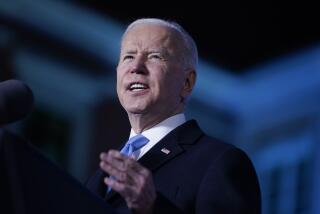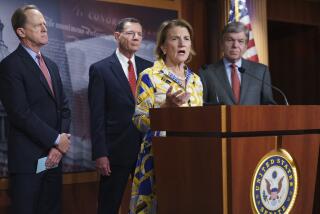Excise Tax Increase Seen Helping in Budget Accord
- Share via
WASHINGTON — Richard G. Darman, the newly retired deputy secretary of the Treasury, suggested Sunday that an increase in excise taxes could form part of “the basis on which there could be a compromise” of budget differences between the White House and Congress.
Darman, who stepped down Saturday after six years in the Reagan Administration, listed an excise tax increase as part of a five-point program for reducing the federal budget deficit that he put forward during an appearance with Senate Finance Committee Chairman Lloyd Bentsen (D-Tex.) on NBC’s televised “Meet the Press.”
Sees Compromise Package
Calling for “a top-level negotiation” between the White House and Capitol Hill, Darman suggested it could produce a compromise revenue package dealing with:
--Sales of government assets, which Reagan’s budget proposes.
--”Some excise tax increases,” possibly in telephone, cigarette and liquor taxes; cuts in “middle-class entitlement programs,” of which the largest are Social Security and Medicare.
--Agreement on a “reasonable and steady rate of growth in defense.”
--Reform in the budget-making process itself.
With the Gramm-Rudman law imposing a $108-billion deficit ceiling on the fiscal 1988 budget, the Administration budget proposes to cut the deficit by $22 billion, mostly by raising revenues from sales of federal assets and higher user fees, while the Democratic alternative, cleared Thursday by the House, would raise $20 billion for the same purpose through unspecified excise taxes. Darman called the main difference between them “just a question of words.”
Both Seek Revenue Hike
“Both the Administration and Congress have proposed revenue increases . . . . The Congress has called it taxes and the Administration hasn’t,” Darman said.
Darman conceded that his formula was “not what the Administration is recommending” and said he did not believe President Reagan was likely to go along with it.
“And I don’t think he should unless he gets the other elements of this compromise . . . . It’s important to have a stable rate of growth in defense. It’s important, if you care about the way financial markets view this, to have a reasonable prospect of reduction in the middle-class entitlement programs over the longer term, and it’s important to have an improved budget process,” Darman said.
Bentsen, whose committee processes tax bills in the Senate, said there was “no question” that there would be some cuts in middle-class entitlements, and he said that Congress had to level out defense spending. He predicted that both excise taxes and user fees would be voted, referring specifically to telephone, liquor and cigarette levies.
On other matters:
--Bentsen said that a world recession is “a possibility,” but that “it doesn’t have to happen” if the economic summit meeting the world’s industrial nations are holding in June in Venice acts to promote economic growth and reduce interest rates worldwide. He said that a 1% reduction in interest rates would bring relief to developing nations and stimulate world trade.
Ties Dollar to Growth
--Darman said “the dollar ideally should stabilize at about the current level,” but that this cannot happen unless there is more growth in Germany and Japan and unless the United States gets control over its deficit. Bentsen called for pressure to keep South Korea and Taiwan from using the rise in the value of the yen to replace Japanese products on the U.S. market.
--Bentsen opposed raising revenues with an energy tax, which would hit oil producers in his home state, but he warned that shortcomings in existing U.S. energy policies are leading to increased dependence on imported oil, which can lead to another fuel shortage within the next five years. He called for new incentives to increase domestic oil drilling.
More to Read
Get the L.A. Times Politics newsletter
Deeply reported insights into legislation, politics and policy from Sacramento, Washington and beyond. In your inbox twice per week.
You may occasionally receive promotional content from the Los Angeles Times.










